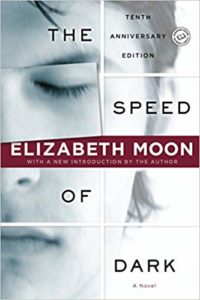This week, I was engrossed in Elizabeth Moon’s The Speed of Dark.
According to the introduction, Moon wrote the book to work through her experiences with her autistic child. She imagined a future in which children like him had access to even better therapies earlier in life and in which businesses would provide more resources (for a tax break, of course).
Our hero, Lou, narrates most of the book, though we get flashes of other points of view in third person. He is high functioning, high functioning enough to critique his mandated therapy appointments with a therapist who underestimates him.
Lou navigates pressures at work, including a new boss who thinks people shouldn’t get accessibility resources, his fencing club, friendship, and a crush.
One of the pressures is that his new boss wants him and other employees like him to try a new therapy to become “normal.”
Should we treat children with autism? Should we try to cure the hearing impaired?This is a contentious topic in disability studies–we do not have consensus on how to balance understandings of disability with difference, defect with culture. In our current social model, of course, “disability” is a key word–without that label, protections and accommodations aren’t guaranteed. In other words, if we took the “disability” label off students who were hearing impaired, they would no longer be eligible for signing translators in their classes.
Lou and his friends have to try to both figure out how to advocate for themselves and to decide whether they want to try to be “normal” instead of who they are.
While the book was compelling, I didn’t find the ending satisfying. It felt a bit rushed.
Still, I recommend this thoroughly. I couldn’t put it down.





